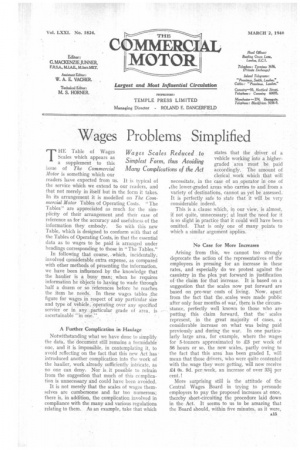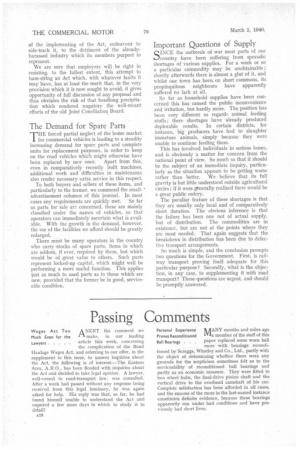Wages Problems Simplified
Page 17

Page 18

If you've noticed an error in this article please click here to report it so we can fix it.
THE Table of Wages Scales which appears as a supplement to this issue of The Commercial Motor is something which our readers have expected from us. It is typical of the service which we extend to our readers, and that not merely in itself but in the form it takes. In its arrangement it is modelled on The Commercial Motor Tables of Operating Costs. "The Tables" are appreciated as much for the simplicity of their arrangement and their ease of reference as for the accuracy and usefulness of the information they embody. So with this new Table, which is designed to conform with that of the Tables of Operating Costs, in that the essential data as to wages to be paid is arranged under headings corresponding to those in "The Tables."
In following that course, . which, incidentally, involved considerable extra expense, as compared with other methods of presenting the information, we have been influenced by the knowledge that the haulier is a busy man; when he requires information he objects to having to wade through half a dozen or so references before he reaches the item he needs. In these wages tables ;the figure for wages in respect of any particular size and type of vehicle, operating• over any specified service or in any particular grade of area, is ascertainable "in one."
A Further CoMplicatittn in: Haulage
Notwithstanding what we have done to simplify the data, the doCument still remains a formidable one, and it is impossible, in contemplating it, to avoid reflecting on the fact that this new Act has introduced another complication into the work of the haulier, work already sufficiently intricate, as no one can deny. Nor is it possible to refrain from the suggestion that much of this complication is unnecessary and could have been avoided.
It is not merely that the scales of wages themselves are cumbersome and far too numerous; there is, in addition, the complication involved in compliance with the many and various regulations relating to them. As an example, take that which Wages Scales Reduced to states that the driver of a vehicle working into a higher Simplest Form, thus Avoiding graded , area must be paid Many Complications of the Act accordingly. The amount of clerical work which that will necessitate, in the case of an operator in one of .the lower-graded areas who carries to and from a variety of destinations, cannot as yet be assessed. It is perfectly safe to state that it will be very considerable indeed.
This is a clause which, in our view, is almost, if not quite, unnecessary; at least the need for it is so slight in practice that it could well have been omitted. That is only one of many points to which a similar argument applies.
No Case for More Increases
Arising from this, we cannot too strongly deprecate the action of the representatives of the employees in pressing for an increase in these rates, and especially do we protest against the casuistry in the plea put forward in justification of the claim for that increase.. It is based on a suggestion that the scales now put forward are based on pre-war costs of living. Now, apart from the fact that the. scales were made public after only four months of war, there is the circumstance, perfectly well known to those who are putting this claim forward, that the scales represent, in the great majority of cases, a considerable increase on what was being paid previously and clurinz. the war. In one particularly large area, for example, where the wages for 5-tonners approximated. to £3 per week of 56 hours or so, the new scales, partly owing to the fact that this area has been graded I, will mean that those drivers, who were quite contented with the wage they were getting, will now receive £4 Os. 9d. per week, an increase of over 334 per cent. !
More surprising still is the attitude of the Central Wages Board in trying to persuade employers to pay the proposed increases at once, thereby short-circuiting the procedure laid down in the Act. It seems to us to be amazing that the Board should, within five minutes, as it were, of the implementing of the Act, endeavour to side-track it, to the detriment of the alreadyharassed industry which its members purport to represent.
We are sure that employers will be right in resisting, to the fullest extent, this attempt to ham-string an Act which, with whatever faults it may have, has at least the merit that, in the very provision which it is now sought to avoid, it gives opportunity of full discussion of any proposal and thus obviates the risk of that headlong precipitation which rendered nugatory the well-meant efforts of the old Joint Conciliation Board.
The Demand for Spare Parts
THE forced partial neglect of the home market for commercial vehicles is leading to a steadily increasing demand for spare parts and complete units for replacement purposes, in order to keep on the road vehicles which might otherwise have been replaced by new ones. Apart from this, even in comparatively recently built machines, additional work and difficulties in maintenance also render necessary extra service in this respect.
To both buyers and sellers of these items, and particularly to the former, we commend the small• advertisement columns of this journal. In most cases any requirements are quickly met. So far as parts for sale are concerned, these are mainly classified under the names of vehicles, so that operators can immediately ascertain what is available. With the growth in the demand, however, the use of the facilities we afford should be greatly enlarged.
There must be many operators in the country who carry ,stocks of spare parts, items in which are seldom, if ever, required by them, but which would be of great value to others. Such parts represent locked-up capital. which might well be performing a more useful function. This applies just as much to used parts as to those which are new, provided that the former be in good, serviceable condition.
Important Questions of Supply
SINCE the outbreak of war most parts of our .....)country have been suffering from sporadic shortages of various supplies. For a week or so a particular commodity may be unobtainable ; shortly afterwards there is almost a glut of it, and whilst one town has been. on short commons, its propinquitous neighbours have apparently suffered no lack at all.
So far as household supplies have been concerned this has caused the public inconvenience and irritation, but hardly more. The position has been very different as regards animal feeding stuffs; there shortages have already produced deplorable results. In certain districts, for instance, big producers have had to slaughter immature animals, simply because they were unable to continue feeding them.
This has involved individuals in serious losses, and is obviously a matter for concern from the national point of view. So much so that it should be the subject of an immediate inquiry, particularly as the situation appears to be getting worse rather than better. We believe that its full gravity is but little understood outside agricultural circles; if it were generally realized there would be a great public outcry.
The peculiar feature of these shortages is that they are usually only local and of comparatively short duration. The obvious inference is that the failure has been one not of actual supply, but of distribution. The commodities are in existence, but are not at the points where they are most needed. That again suggests that the breakdown in distribution has been due to defective transport arrangements.
So much is simple, and the conclusion prompts two questions for the Government. First, is railway transport proving itself adequate for this particular purpose? Secondly, what is the objection, in any case, to supplementing it with road transport? These questions are urgent, and should be promptly answered.




































































